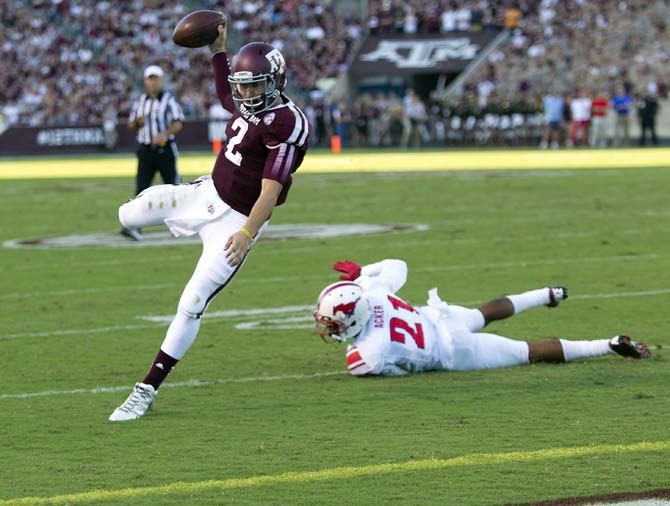In the week leading up to last season’s LSU-Texas A&M game, I set out to write a feature about the Aggies’ freshman quarterback Johnny Manziel. I had never heard of him, but after combing through stats I noticed he led the Southeastern Conference in rushing and figured that could be worth a story.
Since I’d never seen him play, and Texas A&M policy doesn’t allow freshmen to be interviewed, it became tricky.
I interviewed Mark Smith and Julius Scott, the head coach and offensive coordinator Manziel played for at Tivy High School in Kerrville, Texas, and tried to figure out how this moderately-recruited freshman was shredding the SEC.
But the picture they painted was far more interesting. The coaches’ described the legend of Johnny Football, the ultra-competitive playmaker whose gaudy stats and highlight reels turned Texas high school football on its ear.
When asked how such a player could be only the No. 39 quarterback in his recruiting class, Scott explained it best.
“If a guy doesn’t come in the right package, colleges and pros don’t always peruse him very fast,” Scott said. “They can’t measure his intangibles. I promise you, it is not a surprise to any of us that know Johnny Manziel that he is having as much success as he is.”
What happened next had to be a surprise, even for the men who coached him for years. Less than two months after the story ran, Johnny Football became the first freshman to win the Heisman Trophy.
From that point on, nothing was the same.
After a summer of mini-scandal after mini-scandal, the name Johnny Football was no longer a legend – it was a punch line.
And while the meaning of “Johnny Football” changed, so did the adjectives used to describe his exploits. Coach Smith described the Johnny he knew as “phenomenal” and “a good kid, and all he did was make plays.”
No one disagreed that he made plays, but heading into SEC Media Days in Hoover, Ala., this summer, the rest of the description transformed. His critics labeled him immature, reckless and what was wrong with college football. And his constant antics made it easy for them to do.
It began innocuously with a Twitter rant here and a night partying with Drake there. Sitting courtside at the NBA Finals was simply Johnny being Johnny. But it snowballed and eventually the pay-for-signature scandal threatened his NCAA eligibility.
His own fame became a monster that nearly killed the mad scientist that created it — football.
The Johnny Manziel that spoke at SEC Media Days did not match the picture Smith and Scott’s words painted of the high school legend they knew. It wasn’t the same Johnny.
However, the Johnny who nearly lost it all over the summer is not the same one who will take the Tiger Stadium field Saturday.
Johnny Manziel is even better than last season on the field, and there is no talk about Manziel off the field. He’s no longer college football’s biggest circus, just its best player who’s making a beeline toward a second consecutive Heisman.
The “selfish” tag diminished every time he left a game injured only to return in order to carry the team. Any doubts about his toughness disappeared entirely after the Aggies’ game against Vanderbilt last month.
It was one week after Texas A&M lost to Auburn, which effectively ended any chance at winning a BCS National Championship. After suffering separate injuries in each of the past two games, and with millions of NFL dollars at risk, many doubted Manziel would play.
Manziel left no such doubt. He threw four touchdowns and led the Aggies to victory.
He said his team counted on him to be there, so he was. He said his team meant so much to him that sitting out wasn’t an option.
At SEC Media Days Manziel defiantly told everyone that he was a 20-year-old kid doing what 20-year-old kids do. Three months later that same 20-year-old is playing like a field general willing to risk it all for his troops.
At times, he practically put his team on his back and carried them. That’s not something most 20-year-old kids do.
This is what makes Manziel so exceptional. Unlike seemingly every story of a young celebrity whose enormous fame nearly ruined their life, Manziel survived it and has actually come back better than before.
Players like this don’t come around often. Sit back and appreciate the show.
James Moran is a 21-year-old mass communication senior from Beacon, N.Y.
Opinion: This isn’t the same Johnny Manziel
By James Moran
November 21, 2013
FILE – In this Sept. 14, 2013, file photo, Texas A&M quarterback Johnny Manziel (2) rushes for a 7 yard touchdown as he avoids the tackle of SMU defensive back Kenneth Acker (21) during the first quarter of an NCAA college football game in College Station, Texas. Manziel has put up eye-popping numbers similar to and in some cases better than he did a year ago, but most polls don’t have him favored to join Archie Griffin as the second two-time Heisman winner. (AP Photo/Bob Levey, File)





